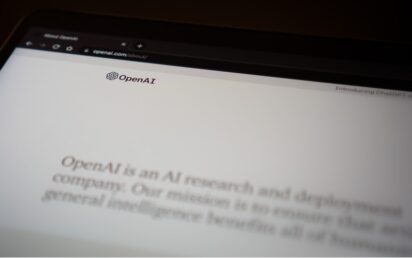The Competition and Markets Authority is considering whether to investigate the partnership between Microsoft and OpenAI.
It is seeking views on whether the relationship between the tech giant and the maker of generative artificial intelligence platform ChatGPT is effectively a merger – and if so, its effect on competition in the UK.
If it feels there is a case to answer, it will initiate a Phase 1 investigation.
The development follows the recent chaos when OpenAI co-founders Sam Altman and Greg Brockman were removed by its board of directors – which oversees the company’s non-profit mission – after it accused Altman of not being “consistently candid in his communications with the board, hindering its ability to exercise its responsibilities”.
The backlash saw almost all of OpenAI’s 770 employees sign an open letter calling on its board to resign and for the reinstatement of Altman and Brockman, both of whom were quickly hired by Microsoft – which has invested billions of dollars in OpenAI in return for a 49% stake – to lead “a new advanced AI research team”, seen as a move to give them oversight over OpenAI despite their removal. Microsoft also extended a hiring invitation to all its workers.
Soon afterwards, a deal was agreed to reinstate Altman as CEO with a new initial board of Bret Taylor (chair), Larry Summers and Adam D’Angelo, while Brockman also confirmed his return.
Taylor is a former co-CEO of CRM giant Salesforce and co-creator of Google Maps, while Summers was US Treasury Secretary to President Clinton. Quora CEO D’Angelo is a current board member and played a role in Altman’s firing alongside Tasha McCauley, Helen Toner and co-founder/chief scientist Ilya Sutskever.
The UK competitions regulator is providing an early opportunity for the parties and interested third parties to comment on whether the partnership between Microsoft and OpenAI – “including recent developments” – has resulted in a relevant merger situation and, if so, the impact that the merger could have on competition in the UK.
In September 2023, the CMA published a report following its initial review of foundation models such as ChatGPT and proposed principles which aim to ensure consumer protection and healthy competition are at the heart of their responsible development and use.
“This is a pivotal moment in the development of this transformative technology,” it said. “The CMA’s recent report into the rapidly evolving market for FMs noted both opportunities and risks for competition and consumer protection.
“Critical among these is the need for sustained competition between AI developers which will help to deliver innovation, growth and responsible practices across the sector, as well as the need for open and effective competition in the deployment of FMs across a range of downstream activities.”
It added that the partnership between Microsoft and OpenAI – including a multi-year, multi-billion dollar investment, collaboration in technology development and exclusive provision of cloud services by Microsoft to OpenAI – represents a close, multi-faceted relationship between two firms with significant activities in FMs and related markets.
“The CMA will review whether the partnership has resulted in an acquisition of control – that is, where it results in one party having material influence, de facto control or more than 50% of the voting rights over another entity – or change in the nature of control by one entity over another,” it said.
Alex Haffner, competition partner at UK law firm Fladgate, said the announcement is particularly interesting given wider concerns about the regulation of AI.
“In order to move forward with any investigation, the CMA will need to find evidence that the recent fall-out from the Sam Altman affair has led to material changes in the governance of OpenAI and, more specifically, Microsoft’s influence over its affairs,” said Haffner.
“Nonetheless, even if it does not pursue matters further, by opening a preliminary investigation the CMA will be able to better understand the scope of the governance arrangements which underpin the OpenAI project and therefore better inform its broader oversight of the fast developing AI sector.”


